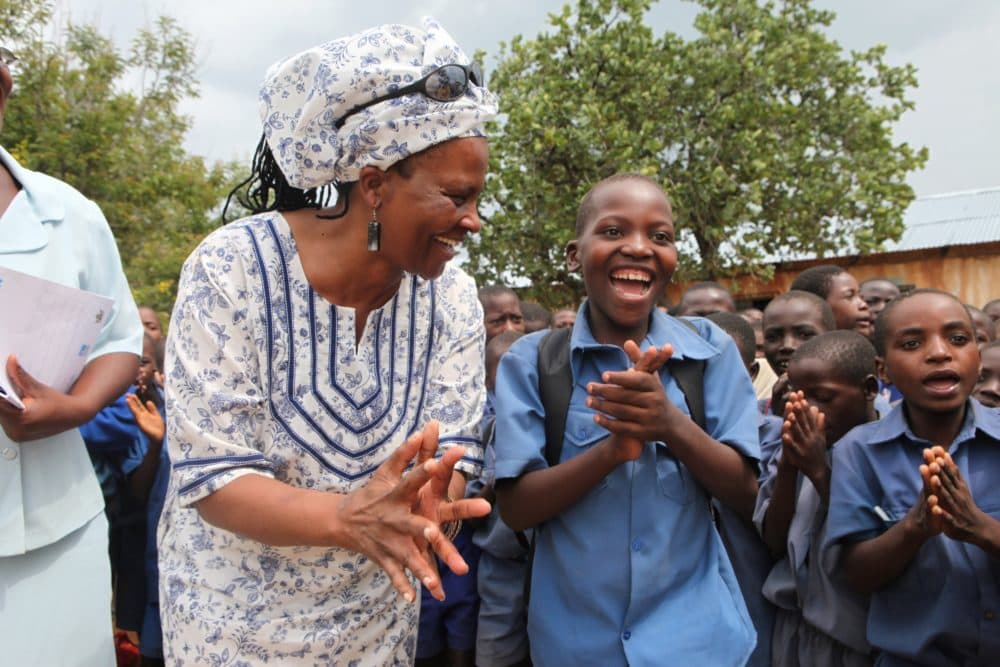Advertisement
Tererai Trent Is Paying It Forward

Tererai Trent grew up on a cattle farm in Southern Africa and was married off at the age of 13.
Raised in rural Rhodesia, the former British colony that is now Zimbabwe, Trent had four children by the time she was 18. She dreamed of getting an education, but only boys went to school because they were seen as the breadwinners.
But that's just the beginning of her story.
She eventually got that education — and earned her doctorate. Today, she runs Tererai Trent International, a foundation that provides quality education to children regardless of gender or socioeconomic background.
Trent is a sought-after speaker, and she'll be taking part in a leadership conference at Simmons University next week. She says her main message will be to encourage resilience, especially in young women.
“Resilience in terms of how do we get up every day when we are faced with so many challenges?” she says. “We have racial tensions, we have the pandemic, which has displaced many women out of employment. And how do we keep our heads up?”
By sharing her own story of the many adversities she has faced in her life, Trent says she hopes she can inspire others to keep going.
“I always say I come from this long line of generations of women who had been denied their right to education,” she says. “Also, I grew up under a colonial system of governance that had oppressed my people for many, many decades. Racism, you talk of all the ugliness that we see today. I lived that and the remnants of that, we still see it in many third world countries.”
As a young girl living in poverty, Trent says her responsibility to her community was collecting firewood and water. But all she wanted was an education, even after she was married to an abusive husband.
Advertisement
“And here I was, a mother of four with no education, and I am thinking, what's going to happen to my life?” she says.
In 1965, Rhodesia gained independence from the British and became the Republic of Zimbabwe. In the years following independence, Trent says women from around the world — Australia, Britain and the U.S. — began visiting Zimbabwe. The women inspired her.
“I wanted the way they walked,” she says. “They had some kind of dignity, the way they would read their papers, the way they would handle their bags. There was that kind of freedom that I wanted.”
One day, Trent says an American woman came to her village and asked her a question no one had ever asked her before: “What are your dreams?”
“And I said, ‘I want to go to America. I want to have an education,’ ” she says. “I remember there was silence because the other women I could feel and hear, they were saying, ‘How can you talk of these things?’ ”
But when she told her mother she had met this woman from America who inspired her, Trent says her mother was so happy. Her mother said Trent would be the one to break “this vicious cycle of poverty” that had been passed through each generation of women in her family.
“I am reminded of being born into this relay race that I always talk about. The race where I ran holding a baton, and I call that the baton of early marriage, the baton of illiteracy, the baton of a colonial system that never respected Black women and Black men,” Trent says. “And so I knew in that discussion with my mother that I needed to redefine this baton and never to pass it on to my girls.”
She did just that. Trent went on to get her bachelor’s, master’s and Ph.D. She says many other women helped her along the way, including Oprah Winfrey, who donated $1.5 million to rebuild Trent’s elementary school in Zimbabwe.
That school is thriving today, and Trent now runs 12 more schools in rural Zimbabwe, educating thousands of students.
Alex Ashlock produced and edited this interview for broadcast with Todd Mundt. Samantha Raphelson adapted it for the web.
This segment aired on March 18, 2021.

